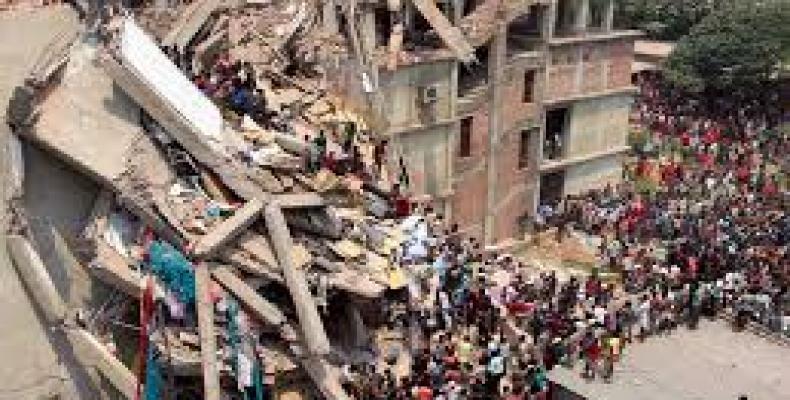Dhaka, April 26 (RHC)-- It's been four years since the eight-story building at the Rana Plaza complex collapsed in Bangladesh claiming over 1,134 lives and injuring 2,500 garment factory workers. According to teleSUR, well over half of the western retail brands that have their sweatshops in the country fail to comply with basic safety regulations.
The collapse showed the grim working conditions in the factories. There are around 4,000 factories employing nearly 4 million workers, with a revenue of nearly $25 billion each year from exports predominantly catering to the U.S. and European markets. Economic exploitation, hazardous conditions, lack of transparency and responsibility continue to remain the norm inside the world's second-largest garment industry.
Following the collapse, the re tail companies joined the U.N. and the Bangladesh government to help improve work conditions.
The government hired over 350 new factory inspectors and passed legislation setting up a workers’ welfare fund and allowing stronger union representation, AP reported. The brand representatives from the European and U.S. retail companies visited the region to suggest improvements.
But the fashion corporate giants continue to exploit and put workers' lives at risk. According to a recent study by Sarah Labowitz and Dorothee Baumann-Pauly published by New York University's Stern Center for Business and Human Rights, since 2015, 3,425 inspections have taken place in Bangladesh, out of which only eight factories passed the inspections, Deutsche Welle reported. The report also added the companies are unwilling to pay for the very basic amenities such as improvements in electrical equipment.
According to a report by the New York-based Human Rights Watch, only 29 companies out of 72 contacted released the information on work and safety conditions in their factories. Last year, these clothing and footwear companies were contacted by a coalition of labor and human rights organizations seeking a transparency pledge urging them to adhere to disclosure of a minimum standard of publishing the supply chain information. But only 17 companies are actually meeting the minimum disclosure standard.
Based on interviews with over 1,000 survivors, a recent study by Action Aid said that nearly half of the survivors from the tragedy remain unemployed. Action Aid Bangladesh Director, Farah Kabir said that in addition to the financial or rehabilitation issues, the survivors were also suffering from social and psychological stress.
Nearly 79 percent of those interviewed stated that they would open a small business rather than go back to being a garment factory worker, while only a meager 4.8 percent said they would go back to working in the factories.
Workers Still Unsafe Four Years After Bangladesh Rana Plaza Disaster

Articles en relation
Commentaires
Laissez un commentaire
Tous les champs sont requis
En reproduction maintenant
24 Horas en el mundo
Au suivant
- Desde Mi Habana
- La Trova Cubana
- Un lugar para la poesía
Plus de visites
- Les États-Unis annoncent des restrictions en matière de visas liées à la coopération médicale internationale de Cuba
- Le chanteur populaire Paulo F.G. meurt dans un accident de voiture à La Havane
- Cuba : les migrants à Guantanamo sont une provocation et un affront à la souveraineté (+Photos)
- Le gouvernement cubain condamne les intentions des États-Unis concernant la base navale de Guantanamo
- Washington révoque la licence accordée à Chevron, "une décision nuisible et d'inexplicable"

